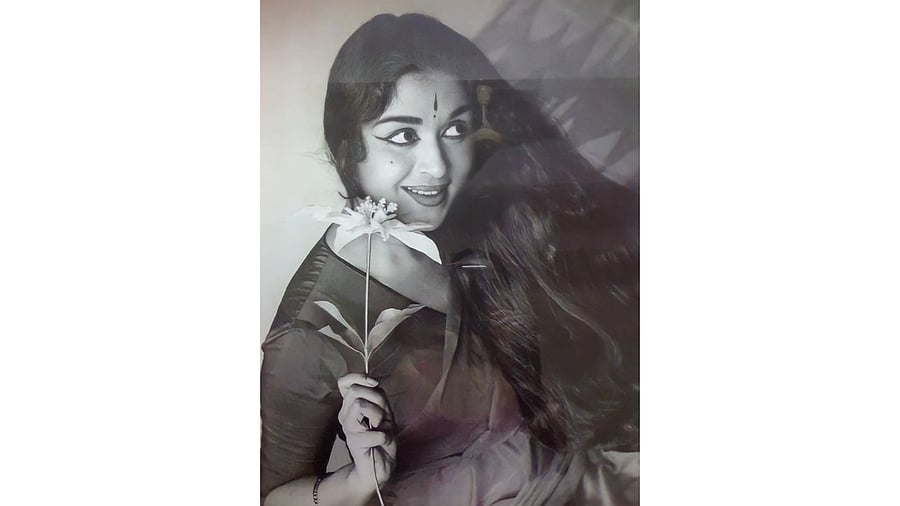
B Saroja Devi
Credit: Special arrangement
B Saroja Devi, one of India’s biggest stars of all time, lived through exciting times. She delivered blockbuster hits, and enjoyed a huge fan following across India.
I had the privilege of visiting her house in Malleswaram, Bengaluru. Over a series of sessions, she recalled many fascinating stories from her remarkable life.
“My Tamil film ‘Kalyana Parisu’ had completed 100 days in three theatres in Bengaluru. The celebrations were grand, and our team travelled from Madras (now Chennai). The event was in the morning. I had to leave for a night shoot in Madras. A group of journalists wanted to felicitate me in the evening. They asked me whether the shooting was more important than my felicitation. I said, “Yes, definitely, shooting is my prime duty.” The journalists were upset. They boycotted me — there was no news about me in the papers for a while. My fans didn’t stop watching my films, so I didn’t bother about it,” she recalled.
Around that time, the stalwart director B R Panthulu wanted to make a Kannada film about Kittur Rani Chennamma, the queen who defied the British, and cast Saroja Devi in the title role. She mentioned the ban to him. “He told me to leave it to him and called a press conference. ‘Saroja Devi is my child, and she will play Rani Chennamma. She needs your support,’ Panthulu told the press. A journalist named Seetharam had written a review of her previous film ‘Anna Thangi’ and praised her without naming her: ‘The actor who played Belli has performed exceptionally well’. Saroja Devi said, ‘I am Belli, and you have appreciated me. Thank you.’ All the journalists laughed, the tension eased, and the rest is history.”
Saroja Devi had a sweet voice. But while shooting for ‘Kittur Chennamma’ (1961), the legendary Puttanna Kanagal, who was then assisting Panthulu, told her to speak boldly and with authority. He made her rehearse her iconic lines over and over again. One of them is remembered to this day — “Nimageke kodabeku kappa? (‘Why should we pay you a tribute?’)”. After Puttanna became a successful director, he did not cast Saroja Devi in any of his films. She recalled: “As actors, we are always looking for good roles. One day, after a meeting at the film corporation, Puttanna said he had a good script and asked me to produce it. I taunted him that he should ask someone from among the heroines he had worked with. He was silent. Eventually, when he made ‘Mallammana Pavada’ (1969), his debut as an independent director, the producer from Madras insisted I play the heroine. Puttanna had to give in. It made history.”
Discipline defined Saroja Devi. She was always punctual and committed to her work. Her mother tongue was Kannada, and she had no problem remembering her dialogues in any language. “There was never a retake because I had forgotten the dialogue. I could deliver with ease even lines in Tamil scripted by Karunanidhi, considered complex.” The directors were always in awe of her capabilities.
And so were the stars. M G Ramachandran was a huge admirer. Saroja Devi’s mother had once told her to take up a fast “to get a good husband.” She was shooting the Tamil film ‘Aasai Mugam’ with MGR. She looked a little tired. When MGR found out about the fast, he chided her, “You are still a young girl. Why all this vratam?” Saroja Devi said, “My mother has told me to do it and I must obey.” MGR was proud of her commitment, both to her work and her mother. He told many in the industry that he liked Saroja Devi because “she is always punctual, ready with the dialogues, dresses aptly for the role and never leaves the sets during the shooting.”
I once asked her who was the fittest of all the matinee idols she had worked with. “MGR, without a doubt,” she said. “Sivaji Ganesan was known for his emotional scenes and MGR was known for action.” She recalled shooting for the song ‘Oru pennai paarthen’ from ‘Daiva Thai’ during which MGR effortlessly lifted her without missing a beat!
“In fact, during a shooting, he fractured his leg, and the doctor advised him a year’s rest. He diligently obeyed. Rumours began that he could not fight any more. After a year he returned with ‘Thaai Sollai Tattaade’, my first film with him, and the first shot shows MGR running and kicking a football out of the field. It was to prove that he was fine. Fans went berserk in the theatres.”
Kittur Chennamma remained her favourite role. “In many ways our lives are similar. After the death of her husband — played by Rajkumar — the queen continues his fight. I felt the same after my husband died. Chennamma’s mother Rudramma, played by M V Rajamma, was a huge support, but she dies leaving Chennamma all alone, and so did my mother. Chennamma’s son died and so did my daughter Bhunvaneshwari. Amidst all this, Chennamma never gave up. I feel the same about myself.”
It was not for nothing that Saroja Devi was called Abhinaya Saraswati, the goddess of acting.
(The author is a senior journalist. Her biography of B Saroja Devi will be out shortly)